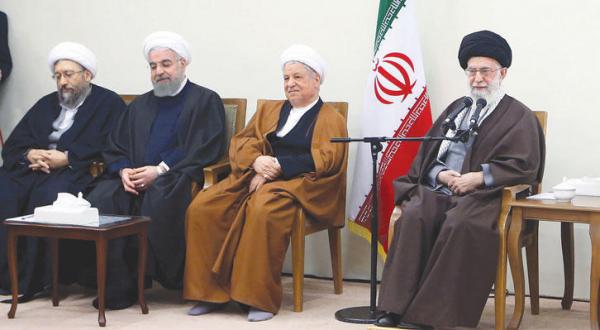
Iran’s Supreme Leader Ayatollah Ali Khamenei meets with the members of the outgoing Assembly of Experts, Tehran
London, New York-Iran’s Supreme Leader Ayatollah Ali Khamenei met for the last time with the outgoing members of the Assembly of Experts before the winners of the Feb. 26 elections take office.
At the last meeting of Iran’s outgoing Assembly of Experts, Supreme Leader Ayatollah Ali Khamenei expressed regret for the departure of two hard-liners and defended the Guardian Council’s disqualification of several Reformist candidates.
The two clerics, chairman Ayatollah Mohammad Yazdi and Ayatollah Mohammad Taqi Mesbah Yazdi will be missing from the next meeting.
In his address to the assembly, Khamenei called the two’s departure “a loss” and stressed that their election “losing” does not “harm their reputation in any way.”
Ayatollah Khamenei deemed it “natural” in any elections for some to win and others to fail. He added, “There are some figures whose characteristics would not be affected by being elected or not; Ayatollah Yazdi and Mesbah are as such and their presence in the Assembly of Experts gave more momentum and weight to this body and their absence in next round is a loss.”
Iranian Supreme Leader has asked the country’s Assembly of Experts to replace him with a “revolutionary” when the time comes.
Moreover, he praised the high turnout of 62 percent in two crucial elections of parliament and Assembly of Experts last month, but warned about efforts by Iran’s “enemies’ to infiltrate.
“We have been harmed by the West and we should not forget it. I am not suggesting cutting ties with them but we should be careful,” he said.
In comparison to the contested 2009 presidential elections, which resulted in protests, Khamenei stressed, “February 26 elections once again proved falsehood of those who tried to discredit 2009 election and brought about that harmful sedition in the country.” “The same way this round of elections was healthful, elections in 2009 and 2005 were also healthful.”
“Unlike indecent behavior of those who failed to win 2009 elections and by causing sedition prepared the grounds for enemy to covet, those not elected in this year elections felicitated the winners, and this is great and valuable.”
Khamenei did not mention names, but Rafsanjani and President Hassan Rouhani, who are also members of the assembly and attended the meeting, have both been critical of the Guardian Council in recent months.
“In choosing next Leader, Assembly of Experts must avoid any discreet, shyness or caution and only consider God, truth and country’s needs,” said Khamenei. “If this significant duty is ignored, the foundation of performance of the System and country will absolutely face problems.”
From his part, United Nations Secretary-General Ban Ki-moon has reacted to Iran’s recent ballistic missile tests by urging Tehran to act with moderation and restraint and to avoid increasing regional tensions.
Ban Ki-moon urged all parties concerned to show restraint. In this framework, he said, “In the current political atmosphere in the Middle East region, and so soon after the positive news of the lifting of sanctions against Iran, the secretary-general calls Iran to act with moderation, caution and the good sense not to increase tensions through hasty actions.”
In a statement issued on Thursday, Ban Ki-moon stated that “it is up to the 15-nation council to examine issues related to resolution 2231, which calls upon Iran not to undertake any activity related to ballistic missiles designed to be capable of delivering nuclear weapons, including launches using such ballistic missile technology.”
